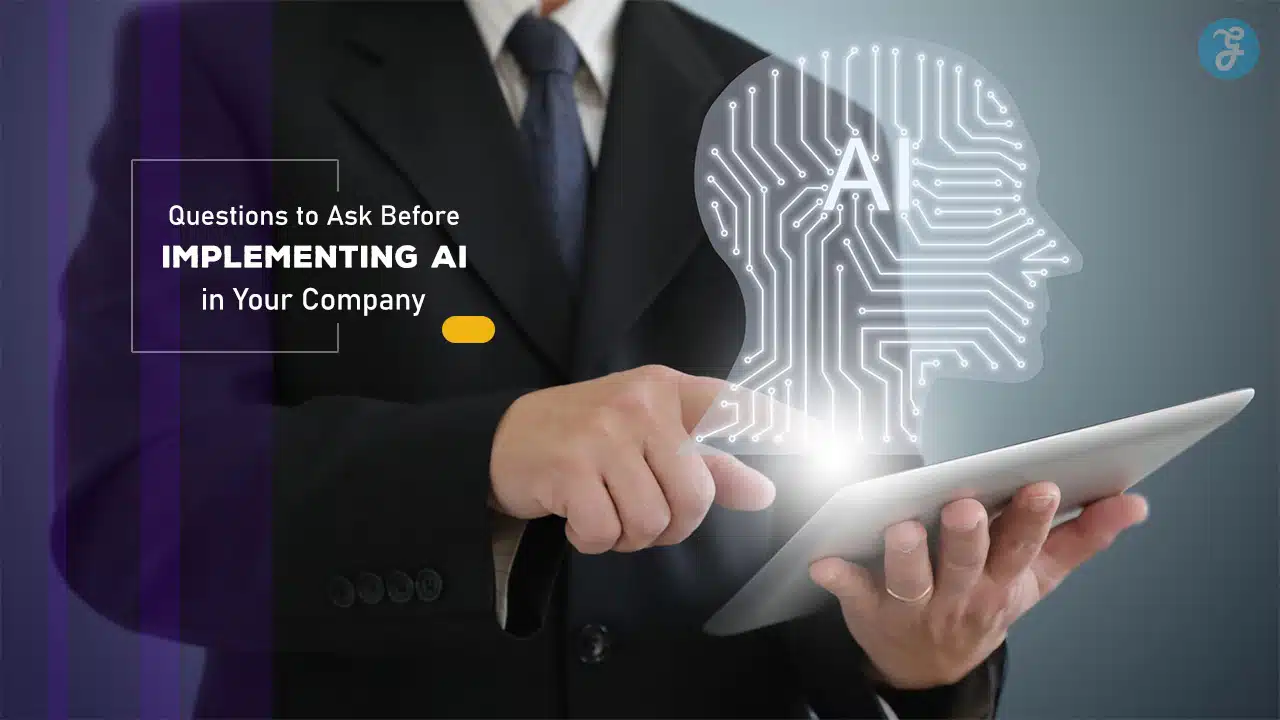Implementing Artificial Intelligence (AI) in your company is a strategic decision that can enhance operations, boost efficiency, and open new business opportunities.
However, introducing AI requires careful planning, assessment of readiness, and understanding of its implications on your organization.
To ensure that your AI implementation aligns with your business goals and delivers value, it’s important to ask the right questions.
These questions help in identifying potential challenges, understanding the impact on infrastructure, workforce, and customer experience, and evaluating long-term benefits.
Here are 20 comprehensive questions to consider before implementing AI in your organization.
1. What Specific Business Problems Will AI Solve?
Why It’s Important:
AI should be a solution to a clear and identifiable problem within your organization.
Defining the specific challenges AI will address helps ensure that its implementation is purpose-driven.
Without a clear understanding of the business problem, the AI system might not deliver the expected results.
Follow-Up Considerations:
- Is the problem related to efficiency, customer satisfaction, or decision-making?
- How is the problem currently handled, and where do the current methods fall short?
- Is AI the best solution, or can other technologies solve this problem?
Example:
If your company struggles with processing large amounts of customer data to personalize marketing campaigns, AI can automate data analysis and deliver more precise targeting.
2. What Are Your AI Objectives and Goals?
Why It’s Important:
Clearly defining your goals allows you to measure the success of your AI implementation.
Whether your aim is to improve operational efficiency, reduce costs, or enhance customer service, having specific objectives will help guide your AI strategy and ensure alignment with broader business goals.
Follow-Up Considerations:
- Are you aiming for short-term efficiency improvements or long-term innovation?
- How will AI support the company’s vision and competitive edge?
- What KPIs will you use to evaluate the AI system’s success?
Example:
If your goal is to reduce operational costs by 20% through automating customer support, set this as a measurable outcome to track AI’s impact.
3. What Type of Data Do You Need for AI?
Why It’s Important:
AI systems rely on data to function effectively. To implement AI, you need large volumes of high-quality, relevant data.
It’s critical to ensure you have access to the right data and understand its structure and format.
Data preparation, including cleaning and labeling, is a key step before any AI implementation.
Follow-Up Considerations:
- What type of data (structured, unstructured, real-time, historical) do you need for AI?
- Is the data available, clean, and in a format that AI models can use?
- How will you collect, store, and process this data to ensure consistency?
Example:
If your AI is focused on customer service improvements, you may need past customer interactions, transaction history, and feedback data.
4. How Will AI Impact Your Existing Infrastructure?
Why It’s Important:
Implementing AI often requires significant changes to your existing IT infrastructure.
Assessing your current system’s capability to handle AI applications, including data storage, processing power, and software integration, will help you understand if upgrades are necessary.
Follow-Up Considerations:
- Does your existing infrastructure have the capacity to handle the computational needs of AI?
- Will you need to migrate data or upgrade to cloud-based solutions to support AI?
- How scalable is your current infrastructure to support future AI expansion?
Example:
A retail company implementing AI for predictive analytics might need cloud-based services to handle large-scale data processing in real-time.
5. What Is the Total Cost of Implementing AI?
Why It’s Important:
AI implementation involves various costs, including hardware, software, data acquisition, hiring or training staff, and ongoing maintenance.
Understanding the total cost helps you determine if AI is a feasible investment for your company and plan accordingly.
Follow-Up Considerations:
- What are the upfront costs for AI development, including software, hardware, and data?
- What will be the recurring costs for maintaining and updating the AI system?
- What is the expected return on investment (ROI), and how long will it take to achieve it?
Example:
A healthcare company implementing AI for patient data analysis should consider the cost of acquiring specialized AI tools, securing sensitive data, and ensuring compliance with healthcare regulations.
6. How Will AI Integrate with Existing Systems and Processes?
Why It’s Important:
Seamless integration of AI into your existing processes and systems is essential for minimizing disruption.
Poor integration can lead to inefficiencies, data silos, and operational bottlenecks.
Understanding how AI will interact with your current software, databases, and workflows is critical.
Follow-Up Considerations:
- Will the AI system require a complete overhaul of your current IT architecture, or can it plug into existing systems?
- How will AI integrate with CRM, ERP, or data analytics tools already in use?
- What processes will need to be adjusted or redesigned for AI to work effectively?
Example:
If your company is using a legacy CRM system, you might need to integrate AI through APIs or upgrade to an AI-friendly platform.
7. What Skills and Expertise Are Required for AI Implementation?
Why It’s Important:
AI requires specialized skills in areas like data science, machine learning, and software development.
Understanding the expertise required for AI implementation helps you identify if your existing team has the necessary skills or if you need to hire or partner with external AI specialists.
Follow-Up Considerations:
- Does your current team have the skills to develop, implement, and maintain AI systems?
- Will you need to recruit data scientists, AI engineers, or machine learning experts?
- Will you work with an external AI vendor or consultant to manage the implementation?
Example:
A manufacturing company implementing AI for predictive maintenance might need to hire a machine learning engineer to build and train predictive models.
8. How Will AI Affect Your Workforce?
Why It’s Important:
AI can significantly alter job roles and responsibilities within your organization.
While AI can automate repetitive tasks, it may also cause concerns about job displacement or require employees to acquire new skills.
Understanding the potential impact on your workforce helps manage this transition.
Follow-Up Considerations:
- What tasks or jobs will AI automate, and how will this affect your workforce?
- How will you communicate AI’s benefits to employees and manage concerns about job loss?
- What retraining or upskilling programs will you provide to employees affected by AI?
Example:
In customer service, AI chatbots might automate routine queries, requiring staff to shift their focus to more complex issues, necessitating additional training.
9. What Are the Ethical Implications of AI in Your Business?
Why It’s Important:
AI systems can raise ethical issues, including bias, discrimination, and privacy concerns.
Addressing these issues upfront ensures that your AI implementation is fair, transparent, and aligned with ethical standards.
Failing to consider ethics can damage your company’s reputation and lead to regulatory scrutiny.
Follow-Up Considerations:
- How will you ensure AI algorithms are fair and unbiased?
- What steps will you take to prevent AI from perpetuating or amplifying existing biases?
- How will you maintain transparency and accountability in AI decision-making?
Example:
A financial institution using AI for loan approval must ensure that the AI does not discriminate based on factors like race, gender, or socioeconomic status.
10. How Will You Measure the Success of AI Implementation?
Why It’s Important:
Defining clear metrics for AI success allows you to track the impact of the technology on your business and ensure that it meets your objectives.
Establishing measurable KPIs ensures that you can quantify AI’s contribution to efficiency, productivity, or customer satisfaction.
Follow-Up Considerations:
- What KPIs will you use to evaluate the performance and impact of the AI system?
- How will you collect and analyze data to measure AI’s effectiveness?
- How often will you review the AI system’s performance to make adjustments?
Example:
If AI is being used to automate customer service, KPIs might include customer satisfaction scores, response times, and the number of cases resolved without human intervention.
11. What Regulatory and Compliance Requirements Must You Address?
Why It’s Important:
AI is subject to a growing body of regulations, particularly in industries like healthcare, finance, and retail, where data protection and privacy are paramount.
Ensuring that your AI systems comply with relevant regulations helps you avoid legal risks and maintain customer trust.
Follow-Up Considerations:
- What data privacy regulations (e.g., GDPR, HIPAA) apply to your AI system?
- How will you ensure that AI complies with industry-specific regulations?
- What documentation and reporting will you need to demonstrate compliance?
Example:
A healthcare provider using AI for patient data analysis must comply with HIPAA regulations to protect sensitive patient information.
12. How Will AI Handle Data Privacy and Security?
Why It’s Important:
AI systems process large amounts of sensitive data, which makes data privacy and security critical.
Protecting this data from breaches and unauthorized access is essential to maintaining customer trust and complying with legal requirements.
Follow-Up Considerations:
- What data security measures will you implement to protect AI systems?
- How will you ensure that data is stored and processed securely, with encryption and access controls?
- How will you handle customer consent for data use in AI systems?
Example:
An e-commerce company implementing AI for personalized recommendations must ensure that customer data is encrypted and protected from external threats.
13. What Are the Potential Risks of AI Implementation?
Why It’s Important:
AI can introduce risks such as system errors, biased outcomes, and unexpected consequences.
Identifying potential risks allows you to create strategies for mitigating these risks and ensuring the safe, reliable operation of AI systems.
Follow-Up Considerations:
- What are the operational and reputational risks of AI failure?
- How will you monitor AI outputs for accuracy and correctness?
- What contingency plans will you have in place to manage AI risks?
Example:
An AI-based hiring tool may inadvertently introduce bias into hiring decisions, leading to reputational damage and potential legal challenges.
14. How Will AI Impact the Customer Experience?
Why It’s Important:
AI can enhance customer experience through personalization, automation, and faster response times.
However, it’s important to ensure that AI-driven interactions don’t feel impersonal or robotic. AI should improve customer satisfaction, not hinder it.
Follow-Up Considerations:
- How will AI improve or enhance customer interactions?
- What balance will you strike between automation and human touch in customer service?
- How will you measure customer feedback on AI-driven services?
Example:
A company implementing AI for customer service should ensure that AI chatbots can handle routine queries while providing seamless escalation to human agents for complex issues.
15. What AI Tools and Platforms Are Available, and Which Should You Choose?
Why It’s Important:
With numerous AI tools and platforms available, selecting the right one for your company’s needs is critical.
Some platforms are industry-specific, while others offer more general functionality.
Choosing the right tool can determine the success of your AI initiatives.
Follow-Up Considerations:
- What features and capabilities do different AI platforms offer, and how do they align with your goals?
- Will you use open-source AI tools, or do you prefer proprietary solutions for support and security?
- How scalable is the platform, and will it grow with your business?
Example:
An AI tool that provides real-time analytics for a logistics company should offer integration with their supply chain systems and provide scalability as the company grows.
16. Will You Build AI In-House or Outsource It?
Why It’s Important:
Deciding whether to build AI solutions in-house or outsource development to third-party vendors is a key decision.
Each approach has its advantages and drawbacks, depending on your company’s expertise, budget, and long-term strategy.
Follow-Up Considerations:
- Do you have the internal expertise and resources to build AI systems in-house?
- Will outsourcing AI development provide faster results and access to specialized expertise?
- What are the long-term maintenance and support implications for each approach?
Example:
A financial firm with in-house data scientists might build custom AI models for fraud detection, while a small retail business may outsource AI development to a vendor offering pre-built solutions.
17. What Is the Timeline for AI Implementation?
Why It’s Important:
AI implementation is a multi-step process that can take time, from data collection and preparation to model training and deployment.
Establishing a clear timeline ensures that each phase is completed on schedule and helps manage expectations across teams.
Follow-Up Considerations:
- What are the key milestones for each phase of AI implementation, from planning to deployment?
- How long will it take to gather and prepare data for AI model training?
- When do you expect to see initial results from the AI system?
Example:
A manufacturing company using AI for predictive maintenance may schedule data collection and model development to take place over the course of three to six months, with testing and full deployment following within a year.
18. How Will You Train and Maintain AI Systems Over Time?
Why It’s Important:
AI systems require ongoing training and updates to remain effective.
Without continuous learning and maintenance, AI models may become outdated, less accurate, or unable to adapt to changing conditions.
Planning for ongoing training ensures your AI remains relevant and useful.
Follow-Up Considerations:
- How will you retrain AI models as new data becomes available?
- How often will you review and update AI algorithms to ensure accuracy?
- Who will be responsible for maintaining and troubleshooting AI systems?
Example:
An e-commerce company using AI for product recommendations should continuously update its models with new customer data to keep recommendations relevant and personalized.
19. What Are the Long-Term Implications of AI for Your Business?
Why It’s Important:
AI is not just a short-term investment—it will have long-term effects on your company’s operations, competitive positioning, and innovation capabilities.
Understanding the future implications of AI helps you plan strategically and ensures that your AI implementation supports sustainable growth.
Follow-Up Considerations:
- How will AI affect your company’s long-term strategy and growth?
- What new opportunities or challenges will AI create for your business in the next 5-10 years?
- Will AI give you a competitive advantage, and how can you maintain that advantage?
Example:
A media company implementing AI to personalize content delivery must consider how this innovation will shape future business models, customer engagement, and content strategy over the next decade.
20. How Will You Ensure Ethical Use and Governance of AI?
Why It’s Important:
As AI becomes more integrated into your business, it’s essential to have governance policies that ensure the ethical use of AI.
Clear governance frameworks help maintain accountability, prevent misuse, and ensure transparency in how AI systems make decisions.
Follow-Up Considerations:
- Who will oversee AI governance within your organization?
- How will you ensure transparency in AI decision-making processes?
- What frameworks will you use to ensure AI systems are accountable, ethical, and fair?
Example:
A bank using AI for credit scoring should implement governance frameworks to ensure that the AI system is transparent, unbiased, and provides explanations for its decisions.
Final Thoughts
Implementing AI in your company is a complex and multi-faceted process that requires careful consideration of technical, ethical, and strategic factors.
By asking these 20 detailed questions, you can ensure that your AI initiatives are well-planned, aligned with your business goals, and executed in a way that maximizes their value while minimizing risks.
With the right planning and foresight, AI can offer transformative benefits to your organization, driving efficiency, innovation, and competitive advantage.







































